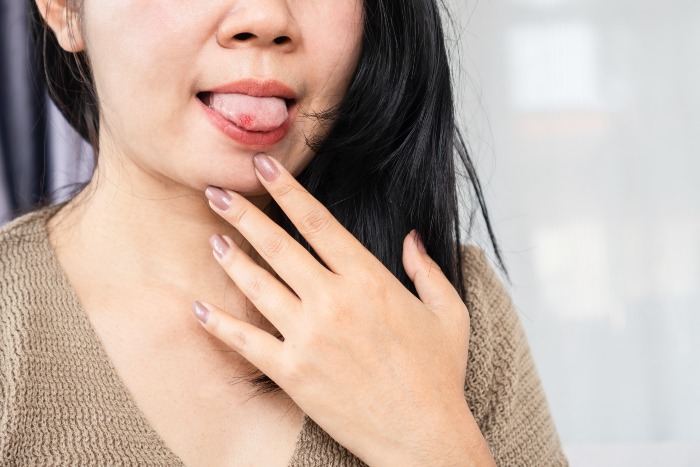Bitten Lip or Tongue
First Aid for a Bitten Lip or Tongue in Edmonton, AB
Accidentally biting your lip or tongue is typically a minor injury that will heal quickly on its own. However, there are still some steps you can take at home to heal a bitten lip or tongue. If these tips don’t work or if you have heavy or prolonged bleeding, signs of infection, or if the bite was due to dental issues or a damaged appliance, call us at Saddleback Dental Centre to schedule an appointment. Here are the best ways to administer first aid for a bitten lip or tongue in Edmonton, AB.

Immediate First Aid for Lip or Tongue Injuries
The most important first step for any type of mouth injury treatment is to stop bleeding. The next thing you should address is pain and discomfort, as well as preventing infection. Following these first aid steps can quickly heal a bitten lip or tongue:
- Apply Direct Pressure to the Wound – To stop the bleeding, you want to use a clean cloth, paper towel, or piece of gauze to apply pressure for 10-15 minutes.
- Use a Cold Compress – To address pain, swelling, and inflammation, you can use a cold compress, ice pack, or bag of frozen vegetables. Cover the compress with a clean towel to prevent direct contact with the skin, and only apply for 15 minutes at a time.
- Disinfect Your Mouth – To reduce the risk of infection, rinse your mouth with clean water. Then mix half a teaspoon of salt with a glass of warm water and swish it around in your mouth for about 30 seconds.
- Don’t Aggravate the Injury – Don’t drink alcohol, hot beverages, or anything acidic. Avoid using tobacco products. Don’t eat anything spicy, salty, chewy, hard, or sticky, as you might end up irritating the wound or biting your cheek, lip, or tongue again.
When to Seek Emergency Dental Care After Biting Your Lip or Tongue
While it’s rare, some mouth injuries require emergency dental care. Injuries caused by a seizure, fall, collision, sports accident, or on-the-job accident can be deeper and more serious. It’s important to recognise the warning signs of infection or other problems that indicate you need emergency dental care. If you see any of these signs or symptoms, call our office right away:
- You are bleeding heavily, or are still bleeding after applying pressure to the wound for 15 minutes.
- The injury is deep or severe.
- The injury is located on the outside of your mouth.
- You have a fever, chills, pale skin, swelling, and pus or discharge from the wound.
- You have trouble breathing, or your pulse is rapid or weak.
- You’re having trouble talking.
Swollen Lip or Tongue Treatment, Healing, and Aftercare
Your healing process will depend on your age, overall health, and the location and severity of your injury. For most people, the injury will fully heal within a few days to a week. As you heal, you should continue to practice your normal daily oral hygiene routine, including brushing and flossing. You can use an antiseptic mouth rinse to speed up the healing process and prevent infection. You can also use salt water rinses, over-the-counter pain medication, oral antiseptic gel, and cold compresses to treat pain and swelling. Continue to avoid eating and drinking aggravating substances until you are healed, and remember that using tobacco products can slow healing and increase the risk of complications.
Common Frequently Asked Questions
Read through the answers to some frequently asked questions about bitten lips and tongues. Feel free to call our office if you have a question that isn’t answered here:
How long to heal a bitten lip? Your healing time may vary, but most people heal within a few days to a week.
When should I visit a dentist after biting my lip or tongue? You may need to go to the dentist if your injury is serious, if it is affecting your oral health, or if it was caused by a dental problem or a damaged oral or dental appliance.
Can biting your tongue or lip be dangerous? If the wound is serious, you may be at risk of an infection or scarring.
